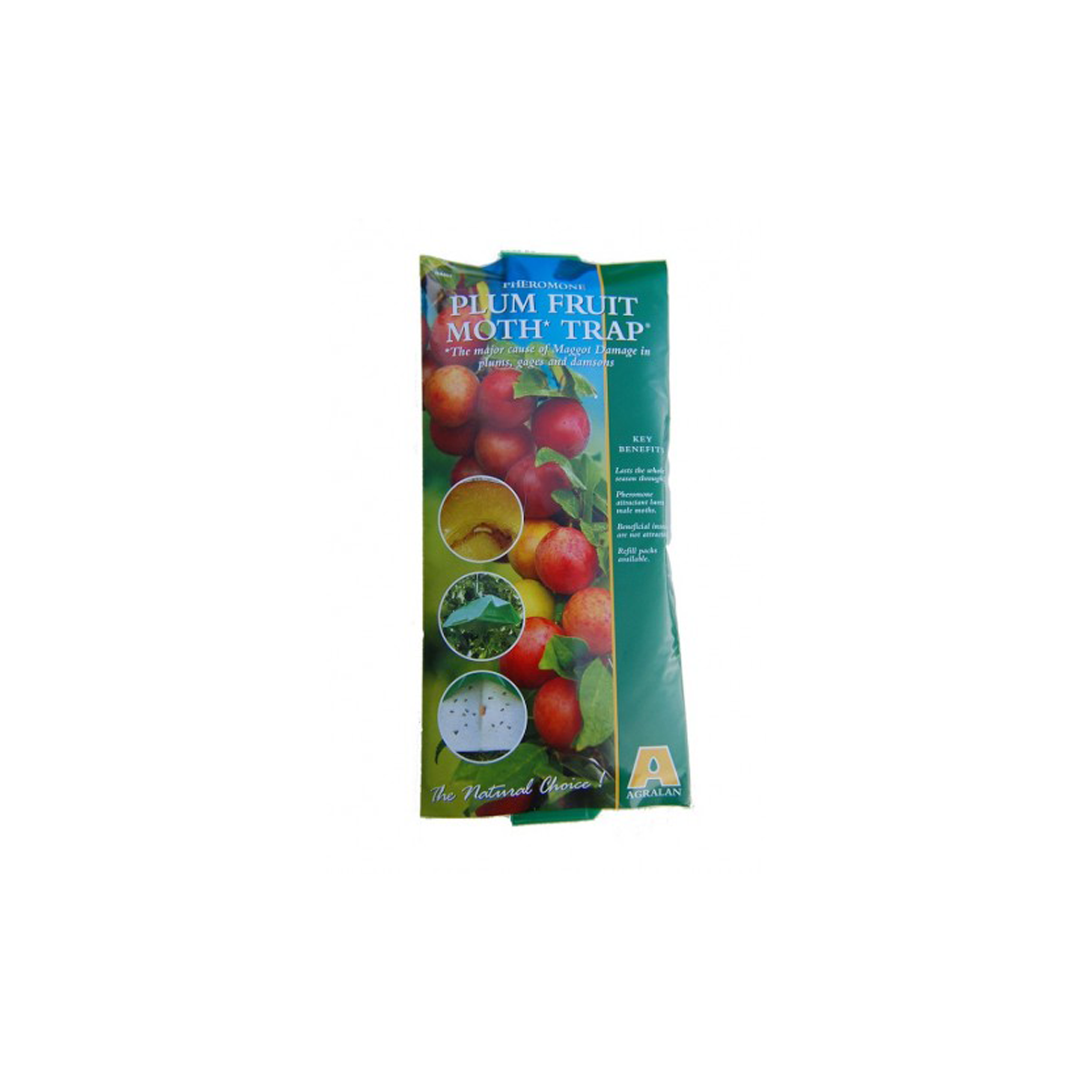
Agralan Pheromone Plum Fruit Moth Trap
Agralan Plum Fruit Moth Trap Protects up to 3 trees, Plum moth is the major cause of maggot damage in plums, gages and damsons.
I'm sorry, we've sold out
Don't worry, if you enter your email below we'll notify you when it's back in stock!
The major cause of maggot damage to plums and gages is the caterpillar of the Plum Fruit Moth.
Control of this pest in the garden is very difficult using insectiides unless they are applied shortly after egg laying.
The Plum Fruit Moth Trap uses pheromones of the femal moths to attract and catch male moths.
This provides a warning as to if and when control measures are needed.
Contents: 1 trap with hanging wire, 2 sticky inserts, 2 pheromone lures.
Important: Only open the lure sachet when the lure is needed.
Caution: The adhesive on the insert is very sticky. It maybe removed from the hands by a proprietary hand cleaner / cream or from other surfaces using white spirit.
Please refer to the instructions for Trap assembly.
When to use the trap.
Moths fly and mate on warm nights from early June until the middle of August.
The trap should be placed in the garden at the end of May.
If spring weather is exceptionally warm, or in sheltered urban gardens, it may be advantageous to install the trap in mid May.
How to use the trap.
The trap should be assembled as per the instructional diagram.
The sticky insert should be unfolded and placed sticky side up in the base of the trap.
The pheromone lure (which looks like a hollow cone of soft rubber) should be removed from the foil sachet and laid in the centre of the sticky insert.
In a garden one trap should monitor up to 5 average sized trees. It should be hung at around head height on the windward side of the tree or group of trees.
Inspect the trap regularly - The moth is small, dark coloured and rests with its wings folded to form a triangular shape.
If you are catching more than 50 moths per week, the infestation is very high and a suitable spray should be applied a week later.
Removal of the trap.
Remove the trap by the beginning of September and dispose of the lure and sticky insert.
The trap should be cleaned and stored.
Barcode: 5019226000171
Weight: 250g
The major cause of maggot damage to plums and gages is the caterpillar of the Plum Fruit Moth.
Control of this pest in the garden is very difficult using insectiides unless they are applied shortly after egg laying.
The Plum Fruit Moth Trap uses pheromones of the femal moths to attract and catch male moths.
This provides a warning as to if and when control measures are needed.
Contents: 1 trap with hanging wire, 2 sticky inserts, 2 pheromone lures.
Important: Only open the lure sachet when the lure is needed.
Caution: The adhesive on the insert is very sticky. It maybe removed from the hands by a proprietary hand cleaner / cream or from other surfaces using white spirit.
Please refer to the instructions for Trap assembly.
When to use the trap.
Moths fly and mate on warm nights from early June until the middle of August.
The trap should be placed in the garden at the end of May.
If spring weather is exceptionally warm, or in sheltered urban gardens, it may be advantageous to install the trap in mid May.
How to use the trap.
The trap should be assembled as per the instructional diagram.
The sticky insert should be unfolded and placed sticky side up in the base of the trap.
The pheromone lure (which looks like a hollow cone of soft rubber) should be removed from the foil sachet and laid in the centre of the sticky insert.
In a garden one trap should monitor up to 5 average sized trees. It should be hung at around head height on the windward side of the tree or group of trees.
Inspect the trap regularly - The moth is small, dark coloured and rests with its wings folded to form a triangular shape.
If you are catching more than 50 moths per week, the infestation is very high and a suitable spray should be applied a week later.
Removal of the trap.
Remove the trap by the beginning of September and dispose of the lure and sticky insert.
The trap should be cleaned and stored.
Barcode: 5019226000171
Weight: 250g




